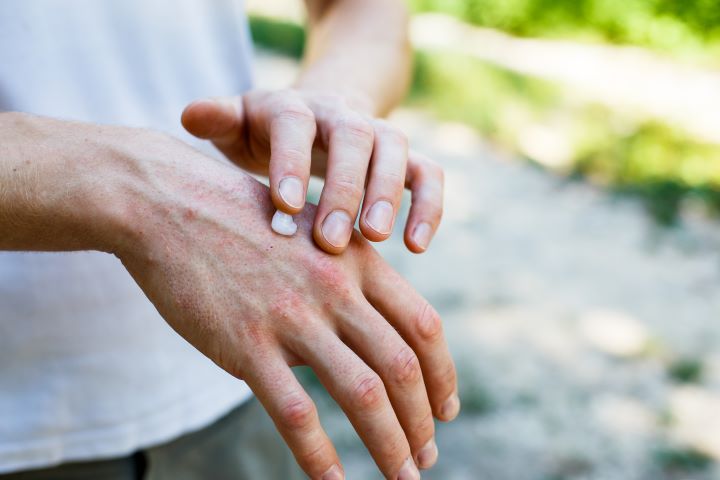These Mistakes Could Be Making Your Eczema Worse
If you're struggling with eczema, it's important to avoid common mistakes that could be exacerbating your symptoms. From using harsh soaps to skipping moisturizer, these errors may be making your condition worse. Learn how to properly care for your skin to alleviate eczema flare-ups.

What is eczema and how does it affect the skin?
Eczema, also known as atopic dermatitis, is a chronic inflammatory skin condition that affects millions of people worldwide. It causes the skin to become red, itchy, and sometimes scaly or blistered. Eczema can occur anywhere on the body but is most common on the face, hands, feet, and in the creases of elbows and knees. The condition often flares up periodically and then subsides, making proper management crucial for those affected.
How can harsh cleansers and soaps impact eczema?
One of the most common mistakes people with eczema make is using harsh cleansers and soaps. These products can strip the skin of its natural oils, disrupting the protective barrier and leading to increased dryness and irritation. Opt for gentle, fragrance-free cleansers specifically formulated for sensitive skin. Look for products labeled “hypoallergenic” or “for eczema-prone skin” to ensure they won’t exacerbate your condition.
Why is skipping moisturization a critical error for eczema sufferers?
Neglecting to moisturize regularly is a significant oversight in eczema care. Proper hydration is essential for maintaining the skin’s barrier function, which is often compromised in eczema-prone skin. Apply a thick, emollient moisturizer immediately after bathing or showering while the skin is still damp. This helps lock in moisture and prevents the skin from drying out. Choose products containing ingredients like ceramides, hyaluronic acid, or glycerin for optimal hydration.
How does ignoring triggers contribute to eczema flare-ups?
Many people with eczema fail to identify and avoid their specific triggers, leading to unnecessary flare-ups. Common triggers include certain fabrics (like wool), harsh detergents, stress, sweating, and specific foods. Keep a journal to track potential triggers and consult with a dermatologist to develop a personalized avoidance strategy. By recognizing and minimizing exposure to your triggers, you can significantly reduce the frequency and severity of eczema outbreaks.
What role does stress management play in eczema control?
Overlooking the importance of stress management is a crucial mistake in eczema care. Stress can trigger or worsen eczema symptoms, creating a vicious cycle of discomfort and anxiety. Incorporate stress-reduction techniques into your daily routine, such as meditation, deep breathing exercises, or yoga. Regular exercise and adequate sleep also play vital roles in managing stress levels and, consequently, eczema symptoms.
Which skincare ingredients should you look for in eczema treatments?
When selecting skincare products for eczema, it’s essential to choose the right ingredients. Look for products containing colloidal oatmeal, which has anti-inflammatory properties and can help soothe itchy skin. Other beneficial ingredients include niacinamide, which helps strengthen the skin barrier, and allantoin, known for its moisturizing and skin-soothing effects. Avoid products with fragrances, dyes, and alcohol, as these can irritate sensitive skin.
When it comes to eczema treatments, there are various options available, ranging from over-the-counter products to prescription medications. Here’s a comparison of some common eczema treatment options:
| Treatment Type | Product Example | Key Features | Cost Estimation |
|---|---|---|---|
| OTC Moisturizer | CeraVe Moisturizing Cream | Contains ceramides, hyaluronic acid | $15-$20 for 16 oz |
| OTC Hydrocortisone | Cortizone-10 Maximum Strength | 1% hydrocortisone for itch relief | $6-$8 for 1 oz |
| Prescription Topical Steroid | Triamcinolone Acetonide Cream | Stronger anti-inflammatory effects | $10-$30 with insurance |
| Prescription Non-Steroid | Tacrolimus (Protopic) | Calcineurin inhibitor, steroid-free | $60-$100 with insurance |
| Oral Medication | Dupixent (dupilumab) | Biologic for moderate-to-severe eczema | $2,000-$3,000 per month without insurance |
Prices, rates, or cost estimates mentioned in this article are based on the latest available information but may change over time. Independent research is advised before making financial decisions.
In conclusion, managing eczema effectively requires a comprehensive approach that goes beyond simply treating symptoms. By avoiding harsh cleansers, maintaining proper moisturization, identifying and avoiding triggers, managing stress, and choosing the right skincare ingredients, you can significantly improve your eczema control. Remember that everyone’s skin is different, and what works for one person may not work for another. Consult with a dermatologist to develop a personalized treatment plan that addresses your specific needs and helps you achieve healthier, more comfortable skin.
This article is for informational purposes only and should not be considered medical advice. Please consult a qualified healthcare professional for personalized guidance and treatment.
The shared information of this article is up-to-date as of the publishing date. For more up-to-date information, please conduct your own research.




